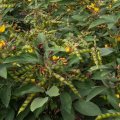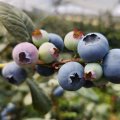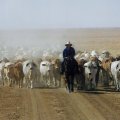QUEENSLAND Premier Campbell Newman has today announced a $4 million international collaboration to improve sorghum productivity under drought conditions.
Scientists from the Queensland Alliance for Agriculture and Food Innovation (QAAFI) at The University of Queensland will work with colleagues in the Department of Agriculture, Fisheries and Forestry (DAFF) to address problems common to sorghum growers in many of the globe’s low-rainfall regions.
Underpinning the research is a $4 million grant from the Bill and Melinda Gates Foundation, supported by the research-expertise and resources of UQ, DAFF and the Ethiopian Government.
“This is certainly one of the biggest international drought-tolerant sorghum research programs ever undertaken,” Mr Newman said.
“The Government is delighted to work with the Gates Foundation to support such an important project.
“Improved drought resistance is vital to global food security and supports our commitment to double the value of food production in Queensland by 2040.
“The Gates Foundation grant and support for sorghum improvement is complemented by local growers, making land available for trial plots and working closely with our research teams.”
Minister for Agriculture, Fisheries and Forestry John McVeigh said this collaboration was a win-win for both Queensland and African sorghum research.
“Like Queensland, Africa needs improved drought-resistant sorghum varieties,” Mr McVeigh said.
“This grant from the Gates Foundation will help secure food supply in Africa while at the same time benefiting Queensland’s $429 million sorghum crop (farm gate value) and the valuable livestock industries it supports.”
UQ Vice-Chancellor Professor Peter Høj joined the Premier and the Minister for Agriculture, near Dalby, to congratulate the project’s researchers.
“The Gates Foundation’s commission is testament to the outstanding combined expertise of UQ and DAFF researchers, especially those who focus on agriculture and sustainable food production,” Professor Høj said.
“UQ is very pleased to lend its strength as a global leader in agricultural research to a partnership targeting high-impact, practical outcomes for people internationally and at home.
“As well as aiming to alleviate hunger in sub-Saharan Africa, the research may stimulate Queensland’s sorghum industry, which adds hundreds of millions of dollars to the state’s economy and is a mainstay of many rural communities.”
One of Australia’s most experienced sorghum plant breeders, Associate Professor David Jordan, and sorghum crop physiology/modelling authority Professor Graeme Hammer, both from QAAFI, will lead the team tasked with improving sorghum yields.
“Sorghum is the world’s fifth most important cereal and a staple food crop for millions of people in the semi-arid tropics,” Dr Jordan said.
“It’s crucially important to food security in Africa as it is grown in the drier and resource-poor areas, where its capacity to better tolerate drought, high temperature, and low fertility make it a preferred crop to maize.
“My colleagues and I plan to use sophisticated computer modelling to exploit new marker technologies, which allow rapid development of new varieties,” he said.
“The project will generate benefits beyond the initial target countries and Australia.
“Our research template provides a basis for other crop improvement programs in impoverished countries such as Ethiopia," Dr Jordan said.
“In addition, there will be intangible benefits to the establishment of enduring relationships between the collaborating countries that will extend beyond the project.”
Dr Jordan said the trait-discovery component of the project would have the potential to deliver global benefits for drought adaptation of crops.
“While it is focused on delivery into the target crop improvement programs, any findings will have far wider applicability,” he said.
DAFF background
The Department of Agriculture, Fisheries and Forestry Queensland (DAFF) jointly runs a large pre-breeding program for sorghum in Australia with QAAFI. Funded by the Queensland Government and Australian farmers through the Grains Research and Development Corporation, this program is at the leading edge of sorghum-breeding technologies. Not only are advances in breeding, physiology and bioinformatics increasing our basic understanding of the sorghum plant, growers are also seeing tangible benefits in their sorghum paddocks. Almost every grain of sorghum produced in Australia now is carrying genes from germplasm released by the program.
QAAFI background
Established in October 2010, the Queensland Alliance for Agriculture and Food Innovation (QAAFI) is an institute of The University of Queensland (UQ), which was formed through and alliance between UQ and the Queensland Government's Department of Agriculture, Fisheries and Forestry (DAFF). Originally QAAFI drew together some 100 research teams specialising in plant, animal and food sciences from 12 UQ and DAFF sites across Queensland. QAAFI's long-term goal is to improve the competiveness and sustainability of tropical and sub-tropical food, fibre and agribusiness sectors through high-impact science. Through science and innovation, the institute pursues research and collaborations that will lead to sustainable agriculture and food. Our objective is to be a world-leading research institute in plant science, animal science, and nutrition and food sciences, delivering outcomes in discovery, learning, and engagement.
Contacts
Associate Professor
Dr David Jordan
Tel: (07) 4660 3622
d.jordan1@uq.edu.au
Media
Premier: (07) 3224 4500
Minister McVeigh: Lachlan Millar – 0407 394 580
Vice-Chancellor’s office – (07) 3365 1384
QAAFI Communications: Ron Hohenhaus – 0417 425 510
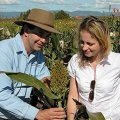

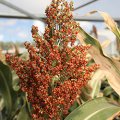
.jpg)


